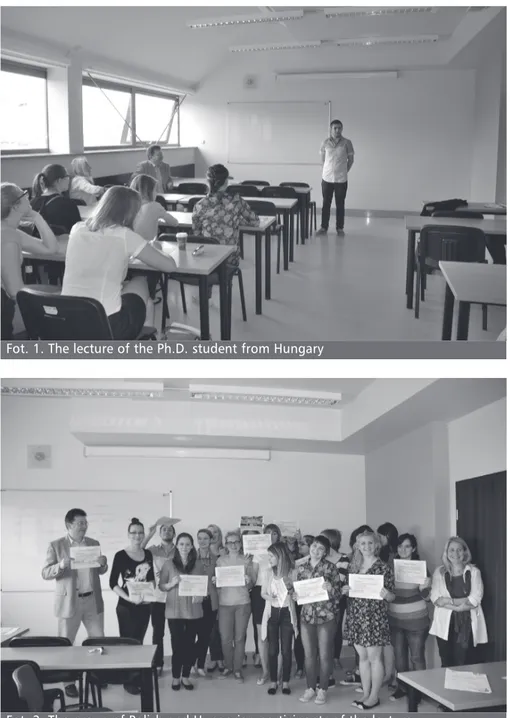179
The 8th of May 2015 saw a meeting of Polish and Hungarianacade-mic teachers and Ph.D. students. It was organized by Dr hab. Jolanta Karbowniczek and Dr Irena Pulak of the Department of Teaching Me-thodology (Katedra Dydaktyki), and Dr Aneta Kamińska of the Depart-ment of General Pedagogy and Educational Theory (Katedra Pedagogiki Ogólnej i Teorii Wychowania). From Hungary came Dr Edrei Gabor and Dr Sara Marton, whose own research interests lie in the field of edu-cational studies and teacher training.
The meeting was divided into two sections. One of these consisted of a lecture, while the other involved a dialogue between Dr hab. Karbowniczek (an associate professor at Ignatianum), Dr Marton, and some students, about teacher training in Poland. The guests were curious about what courses in this subject look like in our country, and asked many questions. Alongside this, our guests were shown our very own Journal of
Elementa-ry Education in TheoElementa-ry and Practice, and were delighted to be offered the
opportunity to publish some of their own articles there.
Sprawozdania z konferencji/Conference Reports
EETP 37(2015)3, ISSN 1896-2327
Aneta Kamińska
Akademia Ignatianum w Krakowie
Report on the Visit
of Hungarian Academic
Teachers and Students
to Ignatianum Jesuit University
in Krakow
180
Sprawozdania z konferencji/Conference Reports
Fot. 1. The lecture of the Ph.D. student from Hungary
181
As for the lecture, it was given by Dr Erdei Gabor and his assistant –a Ph.D. student. The topic was the Hungarian educational system. Toge-ther, they explained some of its distinctive features, referring both to the issue of educational levels and to some urgent educational problems. Then some Polish students posed a number of additional questions about some specific modifications that have been introduced into the field of educa-tion in Hungary. Dr Kamińska and Dr Adienne Fekete compared the approaches with regard to foreign-language teacher training. The Hun-garian and Polish systems were analyzed and many similarities found.
The meeting also witnessed cooperation between Ignatianum Jesuit University and Debrecen University with respect to the Erasmus Pro-gramme. Our Hungarian colleagues invited academic teachers from our institution to Debrecen University for a conference in June 2015. Both Hungarian and Polish participants were pleased to meet each other, and expressed an intention to engage in further collaboration in the future.
